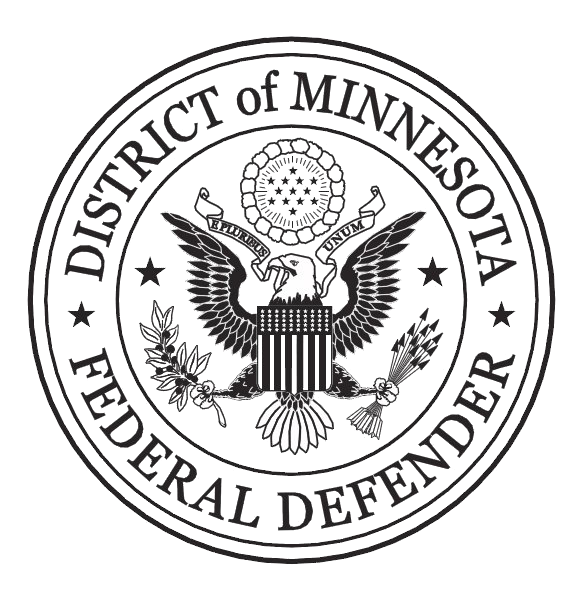Office of the Federal Defender
District of Minnesota
_________________________________________________________________________________________________________________________________
Copyright © 2025
Federal Defenders Office - District of Minnesota
Copyright © 2025
Federal Defenders Office - District of Minnesota

PLEA NEGOTIATIONS AND CHANGE OF PLEA
PLEA NEGOTIATIONS: Before your case goes to trial, your attorney may negotiate a plea agreement with the prosecutor. YOUR ATTORNEY WILL NOT MAKE ANY DEALS FOR YOU WITHOUT YOUR PERMISSION. But he or she will find out what kind of an offer the prosecutor is willing to make in your case and the law requires that they must explain the plea offer to you. Then you can decide what to do, with your attorney’s advice.
GUILTY PLEAS AND THE SENTENCING GUIDELINES: Although the Judge decides what an appropriate sentence will be, in federal court the Judge must begin by determining a sentencing range under the U.S. Sentencing Guidelines. Your attorney will show you how the Guidelines will apply to you if you plead guilty, or if you go to trial and are found guilty. In most cases, pleading guilty will result in a lighter sentence than if you were to be found guilty at trial. This could be so for a number of reasons, but the main reason is because when you plead guilty, you receive a sentence reduction for accepting responsibility for your conduct.
HOW PLEA AGREEMENTS WORK: A plea agreement is a deal between you and the prosecutor. The judge is not part of the deal. In federal court the judge is not allowed to be part of plea negotiations at all. Your part of the deal is to plead guilty. In some deals the defendant pleads guilty to a lesser charge, or to only some of the charges. Sometimes the defendant pleads guilty to all the charges. The prosecutor’s part of the deal is to recommend a sentence you can accept, one that is a lighter sentence than if you had lost a trial.
Because a plea agreement is a deal between you and the prosecutor, it does NOT guarantee that the judge will give you the sentence that you want. As long as the prosecutor makes the recommendation in the plea agreement that you agreed to, they have kept the government’s side of the bargain.
Most judges in the District of Minnesota follow plea agreements, but it is important to understand that the JUDGE DOES NOT HAVE TO FOLLOW THE RECOMMENDED SENTENCE IN THE PLEA AGREEMENT. The judge can legally sentence you to whatever the Guidelines and the law allow. However, it is important to remember that in most cases the Court sentences consistent with the plea agreement.
Plea agreements are put in writing and signed by the defendant, defense counsel, and the prosecutor. Before signing a plea agreement, read it carefully and make sure you understand all of it. Your attorney will go over it with you and answer any questions you may have.
Neither the Judge nor the law make it easy to take your plea back, no matter what your reason. So, it is important that you understand your plea agreement completely before you enter a plea of guilty.
CHANGING YOUR PLEA: If you decide to change your not guilty plea to guilty, there will be a Change of Plea hearing. If you plead guilty, you are giving up many valuable constitutional rights. You lawyer will discuss these with you before you decide to accept a plea offer. The judge will also want to make sure that you understand the rights you are giving up. He or she will make sure that you understand what is going on, and that you are pleading guilty because you want to and not because someone is forcing you. The judge or the prosecutor will go through your rights one by one and make sure you understand the possible sentence. The judge will also ask you to admit facts supporting the charges to which you are pleading guilty. Each judge handles change of plea hearings a little differently. Ask your attorney what to expect from your judge.
REMAND: If you were out of custody before your plea, the judge could have you taken into custody after your plea. Discuss this possibility with your attorney.
GUILTY PLEAS AND THE SENTENCING GUIDELINES: Although the Judge decides what an appropriate sentence will be, in federal court the Judge must begin by determining a sentencing range under the U.S. Sentencing Guidelines. Your attorney will show you how the Guidelines will apply to you if you plead guilty, or if you go to trial and are found guilty. In most cases, pleading guilty will result in a lighter sentence than if you were to be found guilty at trial. This could be so for a number of reasons, but the main reason is because when you plead guilty, you receive a sentence reduction for accepting responsibility for your conduct.
HOW PLEA AGREEMENTS WORK: A plea agreement is a deal between you and the prosecutor. The judge is not part of the deal. In federal court the judge is not allowed to be part of plea negotiations at all. Your part of the deal is to plead guilty. In some deals the defendant pleads guilty to a lesser charge, or to only some of the charges. Sometimes the defendant pleads guilty to all the charges. The prosecutor’s part of the deal is to recommend a sentence you can accept, one that is a lighter sentence than if you had lost a trial.
Because a plea agreement is a deal between you and the prosecutor, it does NOT guarantee that the judge will give you the sentence that you want. As long as the prosecutor makes the recommendation in the plea agreement that you agreed to, they have kept the government’s side of the bargain.
Most judges in the District of Minnesota follow plea agreements, but it is important to understand that the JUDGE DOES NOT HAVE TO FOLLOW THE RECOMMENDED SENTENCE IN THE PLEA AGREEMENT. The judge can legally sentence you to whatever the Guidelines and the law allow. However, it is important to remember that in most cases the Court sentences consistent with the plea agreement.
Plea agreements are put in writing and signed by the defendant, defense counsel, and the prosecutor. Before signing a plea agreement, read it carefully and make sure you understand all of it. Your attorney will go over it with you and answer any questions you may have.
Neither the Judge nor the law make it easy to take your plea back, no matter what your reason. So, it is important that you understand your plea agreement completely before you enter a plea of guilty.
CHANGING YOUR PLEA: If you decide to change your not guilty plea to guilty, there will be a Change of Plea hearing. If you plead guilty, you are giving up many valuable constitutional rights. You lawyer will discuss these with you before you decide to accept a plea offer. The judge will also want to make sure that you understand the rights you are giving up. He or she will make sure that you understand what is going on, and that you are pleading guilty because you want to and not because someone is forcing you. The judge or the prosecutor will go through your rights one by one and make sure you understand the possible sentence. The judge will also ask you to admit facts supporting the charges to which you are pleading guilty. Each judge handles change of plea hearings a little differently. Ask your attorney what to expect from your judge.
REMAND: If you were out of custody before your plea, the judge could have you taken into custody after your plea. Discuss this possibility with your attorney.

107 U.S. Courthouse
300 South Fourth St.
Minneapolis, MN 55415
612-664-5858 - Phone
612-664-5850 - FAX
300 South Fourth St.
Minneapolis, MN 55415
612-664-5858 - Phone
612-664-5850 - FAX